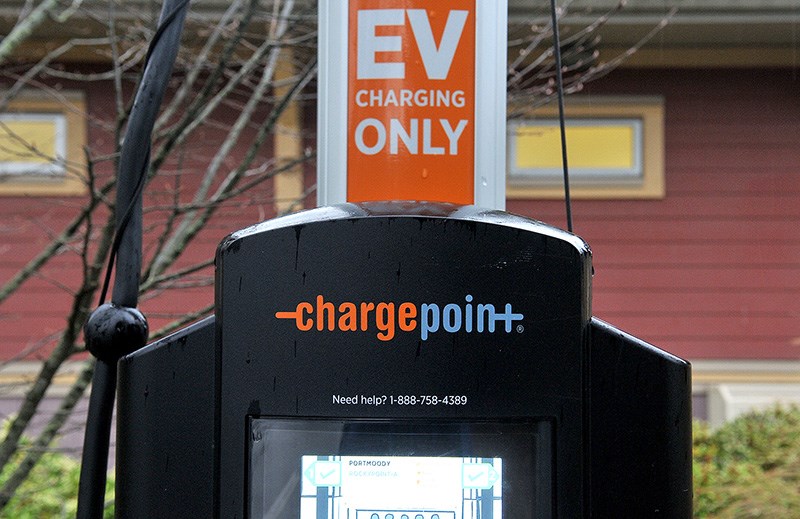Port Moody is one step closer to joining several other municipalities in the Lower Mainland that require new developments to provide outlets for electric vehicle charging stations in parking stalls.
Council on Tuesday unanimously passed first and second readings of a proposed bylaw that would require 240-volt Level 2 outlets be installed in stalls for new multi-family and single-family developments that are approved after March. The requirement wouldn’t extend to visitor stalls, new parking stalls in existing developments or parking for secondary suites. New developments with a commercial component would require charging outlets for at least 20% of the commercial parking stalls.
“This is a great stride forward,” said Coun. Zoe Royer, who chaired Tuesday’s meeting as Mayor Rob Vagramov battled a cold that diminished his voice.
According to a report presented to council by the city’s sustainability and energy coordinator, Laura Sampliner, about 500 electric or hybrid vehicles are registered in the city and ownership of electric vehicles increased 162% in 2017 over 2016. Sales of electric vehicles in the province had increased 202% last spring compared to the spring of 2017.
Public charging stations installed by the city last August have been used more than 3,500 times by more than 300 unique visitors. That amounts to about 30 charging sessions a day, “demonstrating the need for charging infrastructure in the city,” Sampliner said.
The report said the cost varies for installing infrastructure such as outlets, conduit, wiring and dedicated circuits that would accommodate a Level 2 charging station, which charges a vehicle in two to six hours.
Sampliner estimated a single outlet in a ground-oriented building could range from $200 to $500 while installing outlets in multi-unit buildings could cost closer to $5,000 per parking stall. Owners would then have to pay an additional $500 to $1,500 to install the charging stations.
Some of that cost could be recouped by a rebate program for new power supply hookups offered by BC Hydro. The report said requiring retrofitting of existing buildings could be too costly or simply just not feasible.
Sampliner said the city currently negotiates the provision of charging infrastructure on a project-by-project basis with every developer, with mixed success. Entrenching the requirement in a bylaw would make it easier for residents to make the switch to electric vehicles, she said.
Two municipalities in Metro Vancouver — Port Coquitlam and Richmond — currently have zoning bylaws similar to the one being proposed by Port Moody, albeit with no requirement for commercial parking stalls, while Burnaby requires 100% of parking stalls in new single- and multi-family developments to have Level 2 outlets, but has no such requirement for commercial stalls. A bylaw requiring 100% of parking spaces have Level 2 outlets in new residential buildings in New Westminster takes effect April 1.
And Vancouver’s building bylaw requires 20% of stalls in multi-family buildings have Level 2 outlets, along with an electrical room that has capacity for outlets in 100% of stalls, while all new single-family homes, duplexes and coach houses and 10% of parking stalls in commercial buildings must have Level 2 outlets.
Several other municipalities — including Coquitlam, Maple Ridge, Surrey and Langley — are also in the process of developing EV charging proposals.
The proposed bylaw will now go to a public hearing Feb. 12 before it can be adopted.



